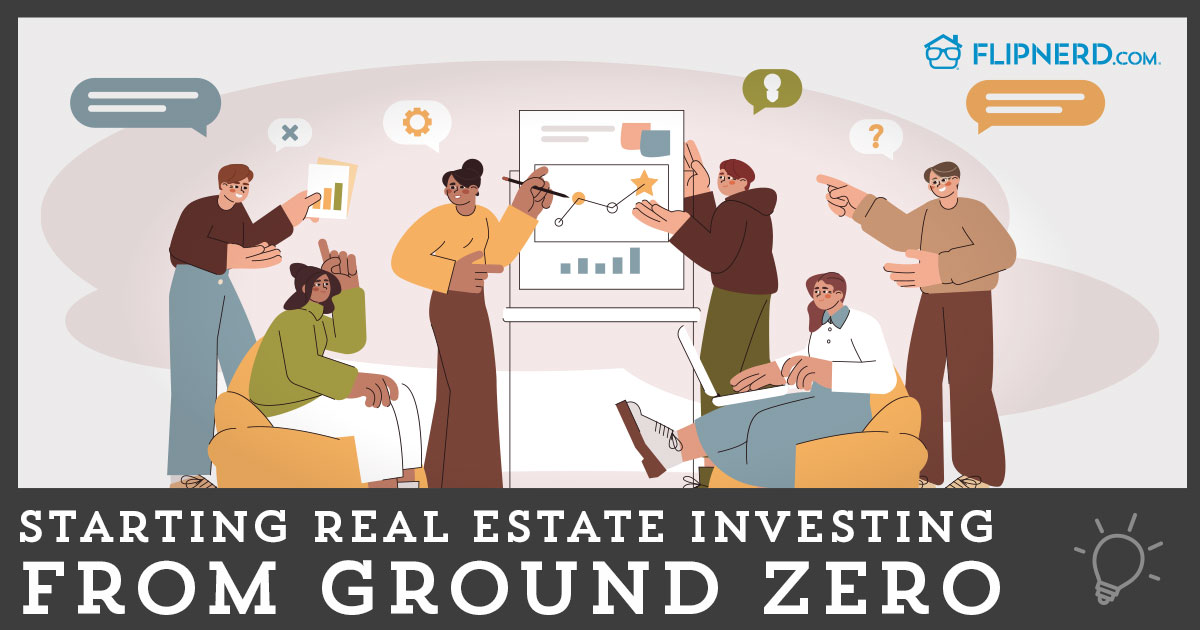Not everything you hear is 100% true.
There are some common misconceptions about real estate investing that aren’t true and we’d like to clear some of them up today.
From having to be wealthy to having to deal with toilets and termites, there’s a lot of half-truths that can be misleading for those considering getting into the industry.
Misconception #1: You can get started with no money
It’d be a perfect storm for you to be able to secure a deal with no money. You’d have to have the deal come to you with no marketing expenses and you’d have to either assign the property with no money down or have a private lender who covers the entire cost of completing the deal.
This rarely happens.
For a lot of assignments, you put a small earnest money deposit down to show you’re serious about the property. Some title companies require this as well.
Most often, you’re going to need money for marketing. You need to get the word out that you’re looking to buy discounted properties.
Sure, there’s a few free ways to market (Craigslist or letting your friends know that you’re looking to buy) but you need paid marketing in order to scale your leads. This can be by direct mail like postcards or online paid marketing such as pay-per-click or Google AdWords.
Unless you have a special relationship with a lender, you’re going to have to put some of your own money in on the deal.
If you’re strapped for cash and do know of someone you can lend to you personally (friends and family), then you can get creative and provide them with a certain return percentage they’re happy with and you keep the remaining profits.
This way, their money is earning interest and if you can build up that trust and show you can close on these deals, they’ll want to do more deals with you.
Misconception #2: You’re on-call 24/7
This only happens if you allow it…
In the beginning, it might be just you who’s answering lead calls but as soon as you’re able to, hiring a virtual assistant to answer the calls during periods that you’re unavailable will be a tremendous help.
If you don’t, you’ll get burnt out and stressed about the business. Remember, this isn’t a business where you should be doing everything.
Delegation will be your friend.
If you aren’t an expert in something, hire it out!
You determine what hours you’re going to work in the business. Are you going to be a slave to the job and try to do it all yourself? If so, you’re never going to be able to scale your business.
Look at your daily schedule and your business needs. You need to be doing the work that is bringing in deals. Otherwise, figure out a way to automate it or hire it out.
Misconception #3: You can get rich quick
Your profits from a good deal can easily be tens of thousands.
But it doesn’t come overnight.
You had to find the property (which usually involves marketing costs and time), rehab it as necessary, and find either a wholesale or retail buyer for it.
This all takes time. There’s also a lot of factors in play here.
- Did you rehab the property? If so, the rehab costs time and money.
- Are you renting the property? This means monthly cash flow but this is a long-term investment that will provide profit over time.
- Are you wholesaling or assigning? This is the quickest way to earn a profit but usually doesn’t provide the maximum profit that a property could bring (rehabs bring in the most profit).
With real estate investments, the payday is varied and you have to prepare yourself for that. One month you might make $30,000 on a deal, have 0 deals the next 3 months, and then close a deal for $13,000.
Concentrate on building up the amount of deals you’re doing and you’ll start feeling those months without pay less.
Misconception #4: Real estate investors are taking advantage of people who need help
You want to be the solution for something who’s needing to sell a property, but that doesn’t mean you’re taking advantage of them.
Most of these properties are in need of updating, have owners who are behind on payments, or have an owner who passed away and it’s been passed down to the kids.
It’s also true that many of the properties investors look at wouldn’t sell on the retail market (on MLS) until it was updated and repaired.
The problem there is that these owners don’t have the time, desire, or money to spend on rehabbing the house.
This is where the investor comes in.
You have the time and money to rehab the property if needed. You have connections to financing and contractors so that the job can be done correctly and efficiently.
This involves your time, resources, and money for you to be able to purchase the property.
You’re not doing it for free.
For owners who need out of a property quickly, you’re one of the best options they have.
If you aren’t able to provide them with an offer that will work for them, you can also lend your advice or even be someone that they vent to for a few minutes.
This is most likely a tough time for them and for you to be a good listener for them or to provide them with another suggestion, it might take you an extra 15 minutes and it’ll make an impact on their situation.
You aren’t there to take advantage.
You’re there to try to help someone who’s in need.
Misconception #5: You have to be wealthy in order to get started
Let’s start by remembering that it’s extremely difficult to get started with no money…
That being said, you don’t have to be rich either.
The key here is to build up a cash reserve if you’re going to leave your normal job and start investing full-time. Deals aren’t consistent like your corporate paychecks so you need to prepare yourself for slow months, especially in the beginning.
Many recommend having a good 6 months of cash reserve built up. This gives you time to market to find leads, go on appointments, secure a deal, repair as needed, and complete whichever exit strategy is best.
Most investors aren’t using all of their own money for deals. You’re securing loans from private lenders, hard money lenders, crowdfunding, or from government financing.
These might be short-term loans but regardless, you’re not using all of your cash.
There are strategies for what type of financing makes sense for different deals. Pay attention to the interest rates and origination fees (points) as those vary from different sources of financing and can quickly add up.
Misconception #6: All renters are the same
If you’re going to build up your rental portfolio, you’ll quickly learn not all tenants are the same.
What we mean by this is that a tenant who has red flags on their application and has a history of evictions isn’t going to be your long-term tenant, most likely.
It’s important to screen your tenants before placing them in a property.
There are certain things you can and can’t ask so make sure you’re asking what’s allowed. There’s a REI Classroom over background screening for tenants by Pete Neubig.
Finding long-term tenants are great for rent-to-own options if that’s what you’re looking for. They also reduce your exposure to vacancies.
Robert Syfert shares how to find a long-term tenant on a REI Classroom that provides good insight on this.
Different states have different eviction laws and the process can take months in some states. These are months that you aren’t having cash flow for the property.
Find the right tenant for the property and make sure you treat them with respect and are timely with responding to maintenance issues. By doing so, they’ll be more inclined to treat you and your property with the same respect and will hopefully be a long-term tenant.
Don’t believe everything you hear
In the real estate investing industry, due diligence is a must.
Don’t go into anything because of what you overheard. Do your own research and make the best decision for your business.
Every state is a bit different with laws.
Each exit strategy varies.
Learn from others around you who are out doing deals.
Figure out what works best for you and create a plan.
Real estate investing can bring you financial freedom if you put in the time and effort.










